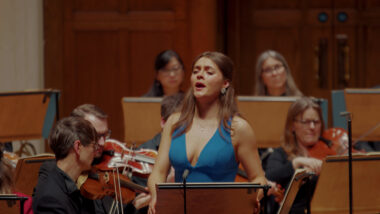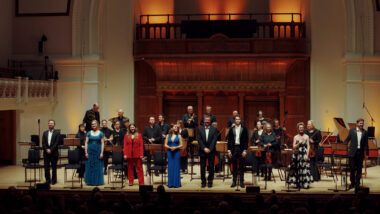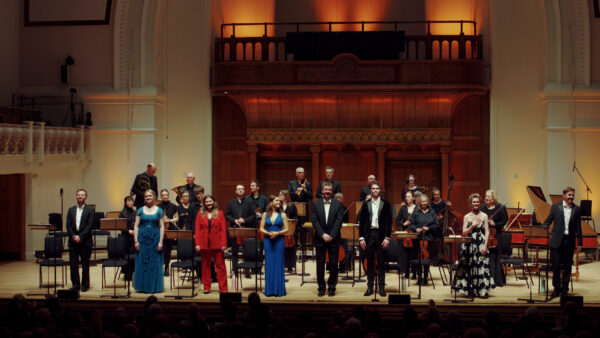 United Kingdom Mozart, La finta giardiniera (concert performance, Bärenreiter edition, ed. Angermüller/Berke): Soloists. The Mozartists / Ian Page (conductor). Cadogan Hall, London, 25.3.2025. (CC)
United Kingdom Mozart, La finta giardiniera (concert performance, Bärenreiter edition, ed. Angermüller/Berke): Soloists. The Mozartists / Ian Page (conductor). Cadogan Hall, London, 25.3.2025. (CC)

Cast:
Sandrina – Ava Dodd
Don Anchise – Michael Ball
Count Belfiore – Hugo Brady
Arminda – Camilla Harris
Ramiro – Laura Fleur
Serpetta – Milly Forrest
Nardo – Jerome Knox
What a silly opera! But a wonderful one. Mozart’s La finta giardiniera, K 196 was premiered in January 1775, and was a success; The libretto is by Giuseppe Petrosellini (1727-99). The story comes with some pre-curtain action: around a year earlier, Count Belfiore stabbed his beloved, Marchioness Violante Onesti in a fit of jealousy. He believed her dead; but she is somehow miraculously fine and with her servant Roberto (aka Nardo) has set off in pursuit of the Count. They get jobs as gardeners to the local mayor (or ‘Podestà’), renamed as Sandrina (Violante) and Nardo. The Podestà now loves Sandrina (but in another early pre-curtain twist the count’s maid, Serpetta, also fancies him).
And that’s before the curtain even rises! Some productions act out the stabbing (as David Lescot’s does, available on DVD/Blu-ray and conducted by Emmanuelle Haïm). No miming here, but Ian Page and his Mozartists’s performance of the Overture had drama aplenty; and how Page brought out the counterpoint in the score. And the opening ensemble (Podestà, Ramiro his house guest and servants Serpetta, Sandrina and Nardo) set the scene for an opera which, while stuffed with individual arias aplenty, came across as a combined effort. Emotions are wildly scattered to the winds: the Podestà excited about his wedding, Ramiro devastated by his beloved Arminda’s abandonment, Sandrina upset by the Podestà’s admiration. It would take far too long to describe each individual offshoot of this mélange, but together they certainly sustain the near three-hour opera. Perhaps one should mention the Belfiore-Arminda-Ramiro – the last a rejected beau, still keen – triad.
Throughout, Page sought out the interest in Mozart’s deft orchestral writing. This is far from the Mozart of the mature operas, but there are pre-echoes aplenty; flashes of what is to come. But perhaps that approach is unhelpful; an alternative is to enjoy the piece for what is, and somehow that just enriches the score. Suffice it to say that at the close, the time had flown by, and my spirit was decidedly elevated.
There is no chorus, and ensembles are rare, so the onus on a concert staging is to avoid a stand-and-deliver sequence of arias. This was managed by each character fully inhabiting heir dramatic personae, despite limited-to-zero acting. That all succeeded is testament to the choice of singers, which I assume is down to Ian Page. Page is known to discover and encourage young talent, and this was a veritable cornucopia.

The titular character, Sandrina, was taken by Ava Dodd, whose light soprano was perfect for the role. Her early ‘Moi donne poverine’ was a delight but also gave hints of deeper emotions to follow, all which she was fully equipped for. I loved Dodd’s Rosina in Barber of Seville at ENO (review here) standing in at the last minute for Anna Devin, and I said at the time I looked forward to encountering her again. Look no further; and a great future surely is ahead of her.
Tenor Hugo Brady, as Count Belfiore, was another stand-out, confident and ardent; he was formerly in love with Sandrina but now betrothed to Arminda. It is obviously a night for former stand-ins to shine in their own right, for previously I enjoyed Brady in a Mozartist Jommelli evening where he replaced tenor Stuart Jackson (review). On the lower part of the female voice range and singing a trouser role – and clad in such as a clue for the plot-bemused in the audience – Laura Fleur brought her rich mezzo-soprano to a role that holds much depth. Fleur was Lady Fortune in the 2022 Guildhall School of Music and Drama’s production of Judith Weir’s opera Miss Fortune and also impressed in their Cendrillon (by Pauline Viardot) and The Apothecary.
Serpetta, Don Anchis’s maid, was brilliantly taken by soprano Milly Forrest, acerbic and confident throughout. It is Nardo who gets to have a bit of linguistic fun though, and baritone Jerome Knox seem to relish singing Italian, French and, yes, English in one aria. Knox is more than a one-trick (albeit trilingual) pony though: his firm tone, superb pitching and superb sense of style made one sit up and take notice. Knox was one of the Princes (Afron) in English Touring Opera’s superb production of Rimsky’s The Golden Cockerel (which I caught at Hackney Empire in 2022: review here) and of all the singers in this Mozart I expect him to go from strength to strength.
Camilla Harris was a fine Arminda, not the most rewarding of roles perhaps but one she absolutely made the most of; she was a lovely Countess Almaviva in Marriage of Figaro at HGO in 2021 (review). And finally, Michael Ball as Don Anchise, was tremendously characterful.
One fervently hopes for a recording. And it was an absolute privilege to be part of these young singers’ career trajectories. A marvelous evening.
Colin Clarke
